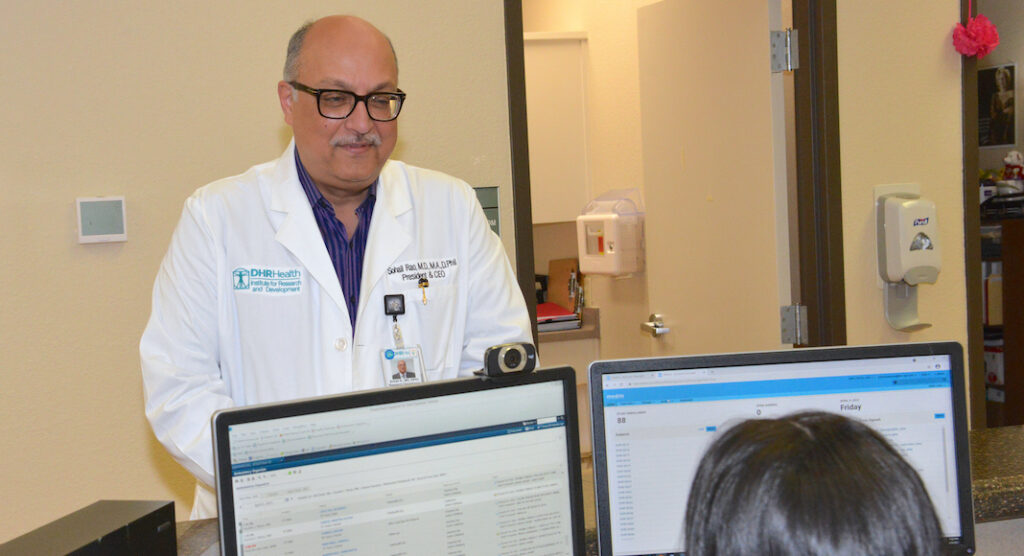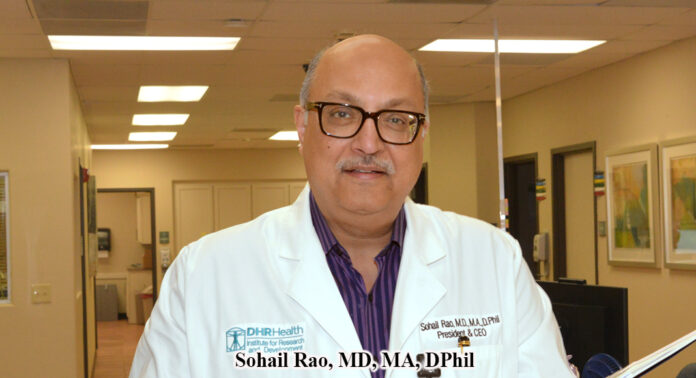By Roberto Hugo Gonzalez
At DHR Health System, the fight against COVID-19 is a daily battle. It has been a journey of very challenging situations that many of us will never forget, even though we are moving forward.
On March 17, 2021, DHR Health Institute for Research and Development announced the arrival of the National Institutes of Health (NIH) Sponsored Mobile Research Unit.
DHR Health Institute for Research and Development is one of nine facilities in the nation granted a unit by the NIH, allowing the institute to continue its mission to treat COVID-19 patients in the Rio Grande Valley.
Mega Doctor News had the opportunity to meet with Dr. Sohail Rao, MD, MA, DPhil; he is the President and Chief Executive Officer at DHR Health Institute for Research & Development. He is an experienced professional with an impressive history of working in academia and the healthcare industry.
Dr. Rao told Mega Doctor News, “The Mobile Research Unit will be used to enroll thousands of patients and volunteers in large scale clinical trials. Its mission is testing a variety of investigational vaccines, monoclonal antibodies, and drugs intended to protect people from COVID-19 and or treat them for acute and chronic complications of COVID-19.”
DHR Health System prides itself on being innovative and leading the way in multiple communities. With the acquirement of the Mobile Research Unit (MRU), DHR Health Institute for Research and Development, solidifies its commitment to South Texas.
The MRU will help expand the capacity to conduct innovative clinical trials that would benefit the residents of the Rio Grande Valley. Dr. Rao pointed out that they will treat patients for chronic complications of COVID-19.
Dr. Rao is one among a few very skilled professionals in Research, Healthcare Consulting, Biotechnology, and Clinical Research. He is an Undergraduate and Graduate in Medical Education, Interdisciplinary Simulation Centers, Clinical Operation (Ambulatory Facilities), and also, in Strategic Planning and International Collaborations.
During the presentation and introduction of the Mobile Research Unit (MRU), Dr. Rao said that last year, around this time, the Rio Grande Valley had the first diagnosed case of COVID-19.
“We recognized then, and today that DHR is probably the only institution in the Valley, which has the infrastructure, but more importantly, the commitment of its team to bring to this community the innovation that we introduce today.”
He said, “Although we are one year from the date when the pandemic hit the Valley and the nation, we still do not have an approved treatment for COVID-19 even most sobering is the thought that now we see many variants originating from this virus.”
He also said that as of this interview, the world is dealing with 11 variants identified as coronavirus spreading across the nation. “Today, I read that there are 15 states in this country registering a rise in patients who have been diagnosed with COVID-19.” This has been seen with the relaxing of the rules during reopening.
“Since there is no recognized and approved treatment for COVID-19 from the Food and Drug Administration (FDA), the mobile unit’s service is paramount,” he emphasized. Everyone is encouraged to continue to be vigilant as prevention is the best treatment.
Dr. Rao said that they are currently working with the National Institutes of Health (NIH) and other agencies and commercial partners to bring the most innovative treatment that will prevent patients from progressing from mild to moderate to severe disease. “Our goal is to keep people healthy, to keep them out of the hospital, and to try to prevent them from actually becoming a victim of COVID-19 disease.”
Regarding chronic complications like cardiovascular, renal, or behavioral changes, he explained, “Former Covid patients are talking about fatigue for a long period. A gentleman who was our patient that received convalescent plasma and already nine months out of treatment, and working, still suffers from chronic cough and fatigue and now has behavioral disorders.”
Dr. Rao said that they are dealing with all fronts, acute and chronic diseases, and chronic complications related to COVID-19.

“Our plan with this research on wheels is to work towards getting a cure for acute disease and how we can prevent or treat those chronic complications.”
The 38′ x 11.5′ mobile unit features a nurse practitioner, research nurse coordinator, driver/coordinator, three exam rooms, and a lobby. He said, “We will have access to enroll thousands of patients and volunteers in large clinical trials, testing a variety of investigational vaccines, monoclonal antibodies, and drugs intended to protect people from COVID-19.”
Dr. Rao stated, “The DHR Health System and the team at the DHR Research Institute are committed to bringing innovation to the Rio Grande Valley. We also have four clinical trials to conduct using the mobile research unit. Two of those are to test unique monoclonal antibodies, which prevent the binding of the virus to its receptor, which causes the pathology that you see.” He continued, “One of those is a pill, given to a patient for 14 days to prevent the virus from harming the body.”
They are participating in eleven COVID-19 trials, and soon they will start vaccination protocol in children at DHR. According to Dr. Rao, they will be using Moderna and Pfizer.
Dr. Marisa Gomez Martinez, the PI for this particular study, said she has been treating COVID patients since the pandemic started last year. “I have seen firsthand what this disease can do to patients and their families.”
She said that her clinic was at about 80% of acute COVID patients at one point, and today she is treating complications of past COVID infections.
Dr. Rao emphasized that DHR Health Institute for Research and Development is committed to providing access to innovative and advanced clinical care for patients in the Rio Grande Valley. Four clinical trials will be initiated in the mobile unit immediately while other trials are being negotiated.
“We are committed to enrolling those individuals who have been most impacted by COVID-19. DHR Health Institute for Research and Development will work closely with the community to make participation in the trial available to those who qualify for clinical research,” Dr. Rao finalized.








